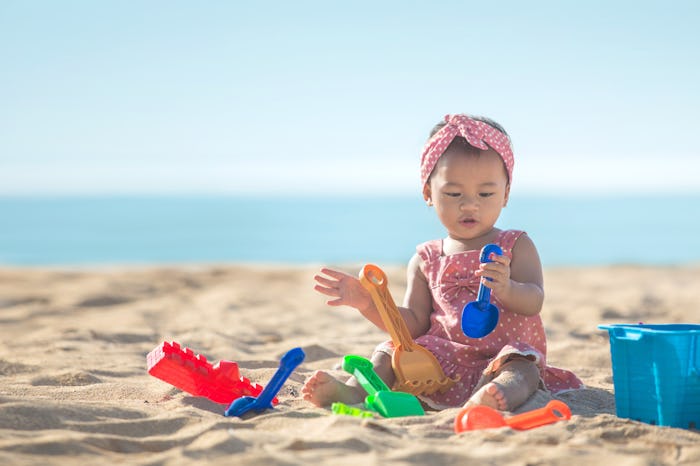Life

Whoa, Taking Your Baby To The Beach Impacts Their Development In A *Huge* Way
We first took our daughter to the beach when she was 9 months old. Her eyes widened at the sight and sound of the waves, the people, and the gulls. She kicked her feet in the water, scooped up fistfuls of sand again and again, and left exhausted but happy. Having always found the shore a restorative place for body and soul, I wondered whether the beach had the same benefits for babies as well. As it happens, I was right all along. Not only is the seaside a fun place for a family visit, it also assists an infant's brain development.
"We first learn about the world and ourselves through our senses. As babies see, hear, touch, smell, taste, and move, they learn about their environment and their place in it. This multisensory processing provides an essential sense of self and security," Lindsey Biel, OTR/L, a pediatric occupational therapist with a private practice in New York City and the co-author of Raising a Sensory Smart Child, tells Romper. "The beach is probably the single most stimulating sensory environment out there!"
It was once believed that babies' development was something that happened naturally, and that it was actually harmful for parents to offer too much stimulation. (Back in the 1910s, moms were told not to pick up their babies except to feed and change them, and one behaviorist even warned that more than an occasional kiss on the forehead would spoil a child!) Thankfully, more enlightened scientists have proven otherwise. Having conducted years of EEG studies on infants, Norwegian neuropsychologist Audrey Van der Meer recently concluded that early sensory stimulation, particularly in outdoor environments, helps babies form the neural connections and motor skills they need for proper development.
In case you needed more convincing that a day at the beach is a great thing for your baby, here's what Biel and other experts have to say.
1Ocean Sounds Are Calming
"The rhythmic sound of the waves" is one of the sensory features Biel cites as being beneficial for a child's development. Why? For one, it's similar to the whooshing white noise of the womb that a baby hears in utero. For another, the water may provide a meditative effect on the brain that we can't experience in any other location, according to Wallace J. Nichols, a marine biologist who has worked with neuroscientists to explore the effects of water on the human mind.
2Sand Improves Body Awareness
"There's a unique body sensation [that comes with] sitting or lying down on the unstable sandy surface of the beach," Biel says. Whether it's by the ocean itself or on a neighborhood sandbox, being able to stand or sit on a sandy surface helps children develop body awareness and gain balance through vestibular movement.
3The Salt Air Boosts Learning
A baby's keenest sense at birth is smell, according to the Urban Child Institute; this helps a newborn seek out its mother's milk. From there, an infant quickly learns to sort out pleasant from unpleasant odors (as any parent who's tried to feed their baby a spoonful of strained spinach will tell you). Taking an infant to the beach exposes them to the tang of salt air, the sweetness of sunscreen, the woody creosote smell of the boardwalk, the aroma of fried treats... it's a sensory feast. As your baby sniffs about, they're discovering what smells they like and dislike, as well as learning how to distinguish Mom's and Dad's personal scents from those of all the other lotion-smeared grownups passing by.
4Water Play Builds Thinking Skills
Letting your baby play with sea water — either in the waves with your protection, or with a bucket for splashing on the sand — is the infant equivalent of an advanced science class. As the child development site Pathways pointed out, water play adds a new level of depth to a child's exploration. Your baby learns what happens when you drop a shell in a water bucket, how water changes the texture and weight of sand, how to pour and scoop with a cup or shovel, and, of course, the age-old marvel of building a sand castle near the shore and watching what happens when the tide comes in. All the while, your little one's brain is learning the basic concept of cause and effect.
5Sensory Preferences & Limits Are Developed
"We are all born with innate temperaments," says Biel. "Some babies are simply born easygoing and positive, adapting quickly to a range of ever-changing sensory experiences; some take a more cautious approach; and other babies find it extremely hard to adapt to new people, places, and sensory experiences." Exposing your child to the sensory-rich environment of the beach allows them (and you!) to discover just what stimuli appeal to them and what they find too overwhelming or unpleasant. For instance, your baby may be content to splash in the water for long stretches, but may be sensitive to the noise of other beachgoers or the glint of the sun on the ocean. You can use that information to help prepare for future shore visits; for instance, if your baby is sensitive to the feel of sand, Biel suggests having extra towels and a container of water handy for washing hands and feet.